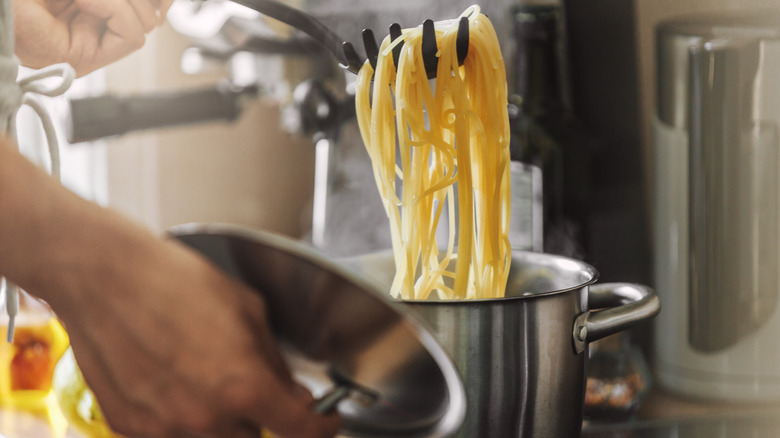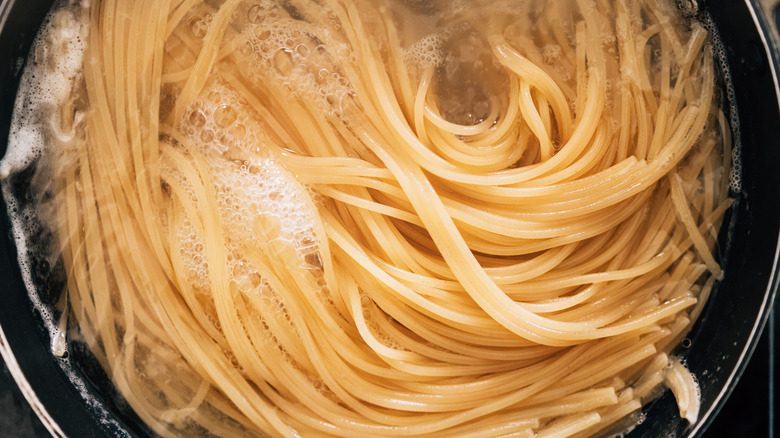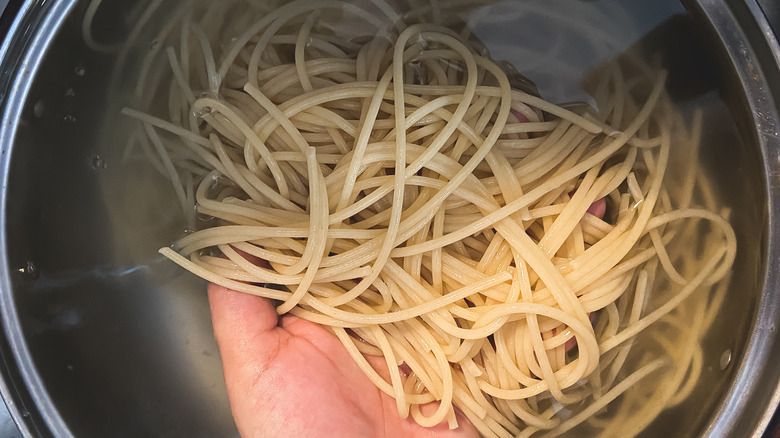When You Should Be Adding Pasta To Boiling Water
We may receive a commission on purchases made from links.
Pasta is a simple staple that can used as the base for incredible meals. Who hasn't sat down to slurp up a hearty helping of spaghetti and meatballs? Relative to its versatility, pasta is pretty easy to make. All it takes is a quick bath in a pot of water and your pasta will transform into the tasty sauce receptacle we all know and love.
According to a YouTube video from Reactions, an American Chemical Society production, soaking pasta causes the noodle's starches to soak up water, which softens it. Per MasterClass, your pasta has been cooked to perfection when it achieves al dente status. Al dente means "to the tooth" in Italian, which is a reference to the firm mouthfeel properly prepared pasta has, as opposed to the mushy texture that characterizes overcooked noodles.
However, the starch in pasta will soak up water regardless of whether or not said water is boiling, though you'll need to introduce heat at some point for the noodles to fully cook (via Exploratorium). With this in mind, should you put your spaghetti in the pot after the water has come to a boil, or toss it in earlier when the water is still cold? The answer to this question is tricky, and there is no consensus opinion among culinary experts.
Will a rolling boil cook your pasta perfectly?
Many culinary experts advise adding your pasta to the pot only after the water has reached a rolling boil. The water in question should also be heavily salted so it seasons your noodles while they cook. Though some folks drizzle some olive oil in the pot to keep their pasta from clumping, you should avoid adding oil, as it can impede your pasta's ability to adhere to the sauce, per Smithsonian Magazine.
Pasta aficionado Anthony Contrino, host of the cooking series "Saucy," voiced his preference for cooking pasta in boiling water in an interview with Today. He explains that the temperature consistency of a boiling pot of water will give you the best chance of cooking your pasta evenly. Additionally, he notes that salt doesn't dissolve properly in cold water, which could screw up your pasta's seasoning. Chef Palek Patel also supports boiling your water first, as pasta that rests in cold water will leach out more starch, which could throw off its consistency.
A cold water cook might result in better pasta
However, others in the culinary world don't feel the same way about boiling water. A key defender of the alternative cold water method is celebrity chef Alton Brown. In a 2019 Twitter thread, he responded to user @drive45music, who tweeted about their partner offering a flippant response when they questioned them for adding pasta to cold water. Brown linked to his blog post about the topic, wherein he lists several benefits of starting your pasta in cold water, which include using less energy and saving time. He recommends that you add your pasta to the cold water in a covered pot and then bring it to a boil. Once it's boiling, you should bring it down to a simmer until your pasta is al dente. The result, Brown feels, is a better pasta texture.
If you decide to try the cold water method, you should be wary of which types of pasta you're using. Chefs at the International Culinary Center have advised against using this method when cooking fresh pasta, and that it would be most effective when using shorter noodles (via HuffPost).


